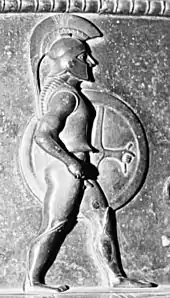Hippocoon (king of Sparta)
In Greek mythology, Hippocoön (/hɪˈpɒkoʊˌɒn, -kəˌwɒn/; Ancient Greek: Ἱπποκόων) was a Spartan king.
| Legendary King of Sparta | |
| Predecessor | Tyndareos(1st reign) |
| Successor | Tyndareos (2nd reign) |
Family
Hippocoon was the son of the Spartan King Oebalus and Bateia. His brothers (or half-brothers) were Tyndareus and Icarius.[1][2] Names of Hippocoön's sons include Dorycleus, Scaeus, Enarophorus, Euteiches, Bucolus, Lycaethus, Tebrus, Eurytus, Hippothous, Hippocorystes, Alcinous,[3] Alcimus, Dorceus, Sebrus, Eumedes,[4] Enaesimus, Alcon and Leucippus (the last three were among the Calydonian hunters).[5] Diodorus Siculus states that there were twenty of them, but gives no individual names.[6]
Mythology
When their father died, Tyndareus became king. Hippocoön, with the help of his sons, overthrew him, took the throne and expelled his brothers from the kingdom . Later, Hippocoön refused to cleanse Heracles after the death of Iphitus. Because of that, Heracles became hostile to Hippocoön, killed him and reinstated Tyndareus.[7] All of Hippocoön's sons were also slain by Heracles, as a revenge for the death of the young Oeonus, son of Licymnius, whom they had killed because he had stoned their dog in self-defense.[8] Heracles's allies in the war against Hippocoön were Cepheus of Arcadia and his twenty sons, who all, as well as Heracles's brother Iphicles, died in the battle (according to Diodorus Siculus,[6] three of Cepheus' sons did survive).
Notes
- in Apollodorus, 3.10.4, all three are called sons of Oebalus and Bateia
- in Pausanias, 3.1.4, Tyndareus' s mother is Gorgophone
- Apollodorus, 3.10.5
- Pausanias, 3.14.6 & 3.15.1
- Hyginus, Fabulae 173
- Diodorus Siculus, 4.33.5
- Apollodorus, 3.10.5; Pausanias, 3.1.4 & 3.15.2
- Apollodorus, 2.7.3; Pausanias, 3.15.4
References
- Apollodorus, The Library with an English Translation by Sir James George Frazer, F.B.A., F.R.S. in 2 Volumes, Cambridge, MA, Harvard University Press; London, William Heinemann Ltd. 1921. ISBN 0-674-99135-4. Online version at the Perseus Digital Library. Greek text available from the same website.
- Diodorus Siculus, The Library of History translated by Charles Henry Oldfather. Twelve volumes. Loeb Classical Library. Cambridge, Massachusetts: Harvard University Press; London: William Heinemann, Ltd. 1989. Vol. 3. Books 4.59–8. Online version at Bill Thayer's Web Site
- Diodorus Siculus, Bibliotheca Historica. Vol 1–2. Immanel Bekker. Ludwig Dindorf. Friedrich Vogel. in aedibus B. G. Teubneri. Leipzig. 1888–1890. Greek text available at the Perseus Digital Library.
- Gaius Julius Hyginus, Fabulae from The Myths of Hyginus translated and edited by Mary Grant. University of Kansas Publications in Humanistic Studies. Online version at the Topos Text Project.
- Pausanias, Description of Greece with an English Translation by W.H.S. Jones, Litt.D., and H.A. Ormerod, M.A., in 4 Volumes. Cambridge, MA, Harvard University Press; London, William Heinemann Ltd. 1918. ISBN 0-674-99328-4. Online version at the Perseus Digital Library
- Pausanias, Graeciae Descriptio. 3 vols. Leipzig, Teubner. 1903. Greek text available at the Perseus Digital Library.
